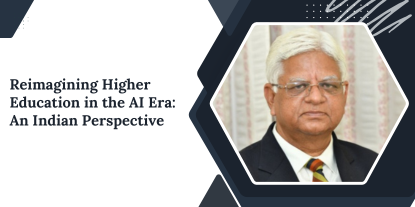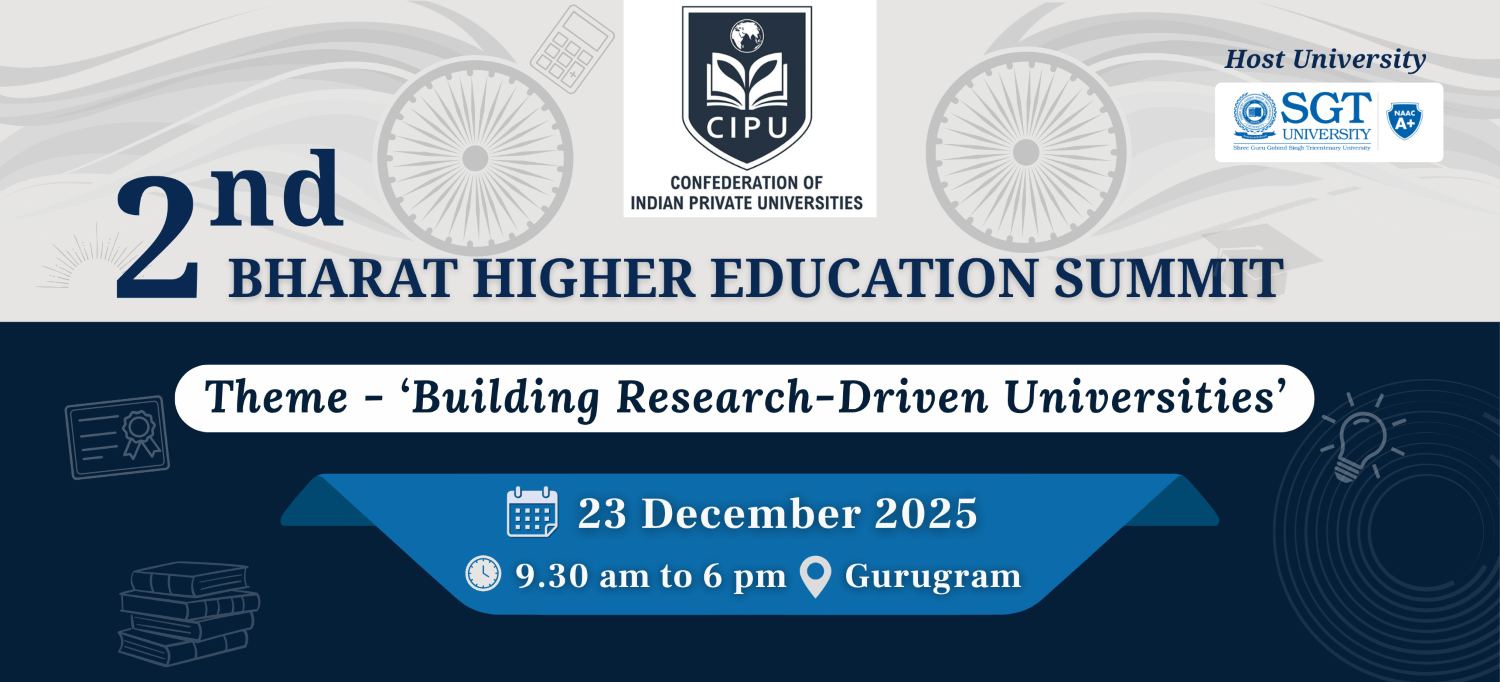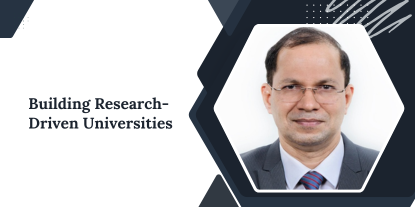
|
Prof.(Dr.) T.N Mathur
Vice Chancellor, IIS (Deemed to be University), Jaipur 302020(Rajasthan). Email: tn.mathur@iisuniv.ac.in |

|
Prof. Astha Pareek
Assistant Professor (Selection Grade), IIS (Deemed to be University), Jaipur 302020(Rajasthan). Email: astha.pareek@iisuniv.ac.in |

|
Prof. Amita Sharma
Assistant Professor (Selection Grade), IIS (Deemed to be University), Jaipur 302020(Rajasthan). Email: amita.1983@iisuniv.ac.in |
Abstract
The unprecedented rise of Artificial Intelligence (AI) has transformed the functioning of modern civilization. Education systems, particularly universities, are at a critical juncture in redefining the paradigms of excellence, equity, and employability. This paper outlines the integration of AI in Indian higher education and the consequent need for adaptive leadership, inclusive curricula, ethical frameworks, and policy-level reforms to ensure that future graduates are not only employable but also globally competent.
Introduction
The emergence of Artificial Intelligence (AI) is significantly transforming the way civilizations function, with profound impacts on economies, industries, and—most notably—education. As Shoshana Zuboff, author of The Age of Surveillance Capitalism (Zuboff,2023), aptly stated: “The real question is not what technology can do. It's what we will choose to do with it.” The same holds true for AI, which presents not only powerful possibilities but also critical choices for humanity.
Universities are taking proactive steps to adapt to the rapid advancements in AI, which is transforming nearly every aspect of life. In India, institutions are harnessing AI to redefine excellence, equity, and employability(Murdan and Halkhoree,2024).As Union Education Minister Dharmendra Pradhan emphasized (Press Information Bureau, 2025), “Our goal is to elevate Indian universities to world-class standards while fostering global connections,” ensuring that no one is left behind in this AI-driven transformation. By integrating AI, universities are reshaping research, leadership, curriculum, and societal engagement.
AI and Academic Leadership: Shaping a Vision for the Future
At the institutional level, leadership is categorized into two types: university leadership, which focuses on university operations, and academic leadership, which centers on academic decision-making. In both contexts, the AI revolution must strike a balance, emphasizing ethics and credibility (Gulumbe et al., 2024), while also fostering globalization and positioning the institution at the forefront of technological advancements. Today, leadership goes beyond managing operations; it demands a strategic vision to keep institutions relevant in an ever-changing landscape (Jaiswal and Arun,2021).
Academic leaders need to be well-versed in both the advantages and disadvantages of AI. This not only promotes AI adoption throughout the university but also ensures its integration into research, teaching, learning, and administration. Academic leadership in AI also entails prioritizing ethical considerations and fostering diversity, ensuring that the technology is applied responsibly, inclusively, and equitably across all domains of academia (Ossiannilsson, 2025). University leadership, meanwhile, must oversee AI's responsible and ethical use, preventing potential biases and injustices. To prepare students for an AI-enhanced world, institutional leaders must cultivate a culture of innovation and continuous learning. AI Technologies, such as machine learning, data analytics, and natural language processing, help optimize resource allocation, improve decision-making, and enhance the educational experience (Ashraf,2024). It is still the leadership's duty to ensure that these advancements are beneficial to all stakeholders concerned.
AI-Integrated Curriculum and Pedagogy: Preparing Students for a Changing World
Universities must evolve their curricula and teaching methods to equip students with the skills needed for the AI era. AI integration into academic programs is essential for producing future-ready graduates. The All India Council for Technical Education (AICTE, 2021) has already mandated AI in engineering curricula, with institutions like Delhi Technological University (DTU) leading the way to ensure students acquire critical AI competencies. Additionally, AI concepts must be incorporated into non-technical fields, like business, economics, humanities, and social sciences, alongside computer science and engineering (The Times of India, 2023).
AI-powered learning systems have transformed traditional pedagogy by personalizing learning experiences through adaptive paths, resources, and real-time feedback. The University Grants Commission (UGC)’s (Ministry of Electronics and Information Technology, 2025) National Programme on Artificial Intelligence (NPAI) framework encourages Higher Educational Institutions (HEIs) to integrate AI across both technical and non-technical disciplines, equipping students with relevant AI skills. NPAI enhances teaching by fostering innovative, adaptive methods, upskilling educators, aligning education with industry demands, and promoting cross-disciplinary collaboration to prepare students for an AI-driven future. The new pedagogies can use AI to close learning gaps. AI-assisted tools like speech recognition, text-to-speech, and real-time translation can help students with disabilities and make learning more inclusive. All students, regardless of their backgrounds or skill levels, will have access to a variety of learning possibilities thanks to this shift towards AI-integrated pedagogy, which promises to democratize education.
Skilling for the Future Workforce: Bridging the Gap Between Education and Industry
As the AI revolution progresses, skills once considered specialized are now essential in nearly every industry. Academic institutions must prepare students for an AI-driven future, where creativity, critical thinking, problem-solving, and emotional intelligence are just as important as technical knowledge. These skills complement AI technologies and are difficult for machines to replicate (Brynjolfsson and McAfee, 2014).
In response, universities are adapting their curricula to integrate both soft and technical skills. AI and machine learning programs are now paired with courses on ethics, leadership, and human-computer interaction to provide a more holistic education (Popenici and Kerr, 2017).
Collaborations between universities and industry are increasing, designing relevant courses, offering internships, and bridging the gap between theory and practice. Universities are also embracing lifelong learning, providing reskilling and upskilling programs for professionals to remain competitive (Yadav and Shrawankar,2025).
AI is central to these efforts, offering personalized learning, online courses, and real-time skill assessments. The NPAI and AICTE mandate to integrate AI into curricula further promote the development of key skills for the AI-enhanced workforce.
AI in Research, Administration, and Policy-Making: Driving Innovation Across the Institution
AI is becoming more and more prevalent in university research and administration, in addition to teaching and learning. Research in several fields is changing as a result of AI's capacity to analyze enormous volumes of data and find patterns. In domains like healthcare, climate science, finance, and engineering, researchers are utilizing AI to evaluate intricate datasets, test theories, and model results. The Ministry of Education, through initiatives like the National Mission on Education through Information and Communication Technology (NMEICT), has launched Virtual Labs, providing remote access to science and engineering laboratories for students and researchers across the country (NITI Aayog, 2023).The UGC has been instrumental in promoting AI research by facilitating collaborations between academic institutions and industry partners. For instance, UGC has supported the establishment of research centers focusing on AI and machine learning, fostering innovation and interdisciplinary research. AICTE has been proactive in integrating AI into higher education. It has encouraged institutions to introduce interdisciplinary AI courses and research programs, establish AI labs aligned with industry standards, and promote ethical AI practices.
AI is streamlining administrative tasks like student support, grading, and admissions, allowing universities to personalize course offerings, track student performance, and identify those needing extra support (Sousa and Cardoso,2025). AI-driven automation boosts productivity, reduces costs, and frees up funds for research.
AI also aids in university policymaking by supporting data-driven decisions on curriculum (Elugbaju et al., 2024), budget allocation, and student welfare, helping institutions improve engagement, retention, and overall effectiveness.
These advancements collectively enhance university research and administration, ensuring institutions are prepared to integrate AI for academic and operational excellence.
Ensuring Inclusivity and Access in the AI Age
While AI has many advantages, there are drawbacks as well, particularly with regard to equity and accessibility. For children in underprivileged or rural locations, who might not have access to the resources and technologies necessary to fully benefit from AI-powered education, the digital divide is still a major worry. Universities have an obligation to make sure AI is utilized to close these gaps rather than broaden them (Pedro et al., 2019).
Universities must make AI technologies available to all students in order to guarantee inclusion. This can be accomplished by investing in infrastructure, providing teachers and students with training and assistance, and providing reasonably priced learning platforms. Fairness must also be considered in the development and application of AI. Universities must implement moral AI procedures that remove prejudices, encourage openness, and protect against discrimination in AI-powered systems like grading or admissions (Wang, 2025).
Conclusion
Universities have a chance to take the lead in redefining excellence, equity, and employability as AI continues to influence the future. Universities may guarantee that students are adequately equipped for the workforce of the future by incorporating AI into their research, leadership, administrative, and curriculum activities. But doing so calls for a deliberate and responsible approach to the deployment of AI—one that places a high value on diversity, moral behavior, and ongoing skill improvement.
With AI acting as a force for good—improving knowledge, fostering equality, and equipping students to prosper in a world that is changing quickly—Indian universities are ideally positioned to be at the center of this revolution. Universities have a more important role than ever in shaping a just and creative future as AI becomes a more integrated aspect of higher education.






